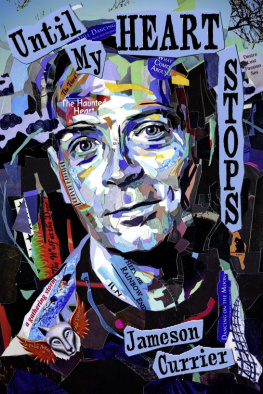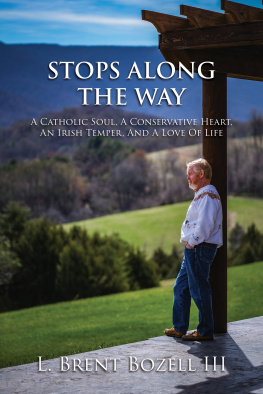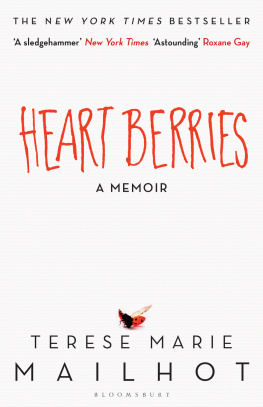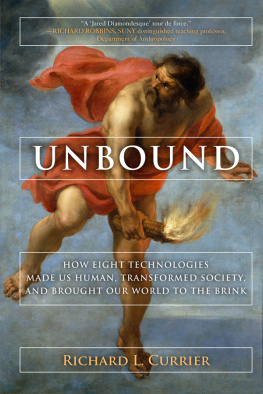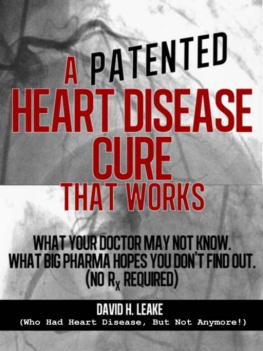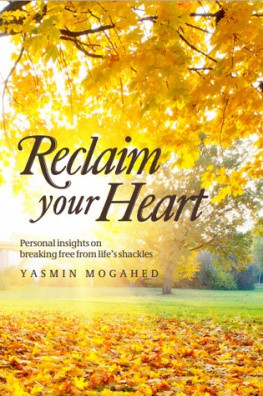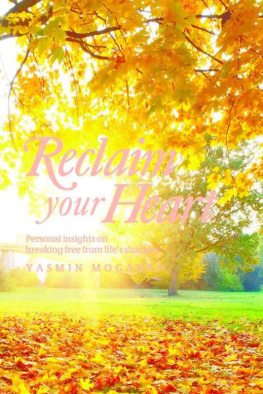UNTIL MY HEART STOPS
intimate writings
Jameson Currier
Published by Chelsea Station Editions atSmashwords
Until My Heart Stops
by Jameson Currier
Copyright 2015 by Jameson Currier.
All rights reserved.
No part of this book may be reproduced in anyform without written permission from the publisher, except by areviewer, who may quote brief passages in a review whereappropriate credit is given; nor may any part of this book bereproduced, stored in a retrieval system, or transmitted in anyform or by any meanselectronic, photocopying, recording, orotherwithout specific written permission from the publisher.
In some cases factual names and details havebeen altered or fictionally created as composites in order toshadow a specific person. In other cases, the author has relied onartistic license for thematic or narrative intent.
Ebook design by Peachboy Distillery &Designs
Cover art by Patrick Bremer
Published by Chelsea Station Editions
362 West 36th Street, Suite 2R
New York, NY 10018
www.chelseastationeditions.com
info@chelseastationeditions.com
Print ISBN: 978-1-937627-17-1
Ebook ISBN: 978-1-937627-64-5
Library of Congress Control Number:2015951908
Contents
Until My Heart Stops
________________
UNTIL MY HEART STOPS
By the time you read this introduction I willhave reached the age of sixty. As long as I have been writing Ihave wanted to publish a collection of my nonfiction, butthroughout my writing career I have tread a thin line between whatis fact and what is fiction in my work, often using details from myown life to flesh out those of my fictional characters andsometimes using narrative creativity to embellish the point of myown life in an essay. In some cases I have published a story asboth fiction and nonfiction. What you have here is no different,though this collection of stories leans as close as I may come topublishing a memoir. As is stated on the copyright page in somecases factual names and details have been altered or fictionallycreated as composites in order to shadow a specific person. Inother cases, I have relied on artistic license for thematic ornarrative intent. But the truth remains behind why I write and whatI write: I write to understand my own life better and to comprehendmy place in the world.
The earliest written work included in thiscollection was created in the early 1980s as I was experimentingwith subjects and expressions. Im not a graduate of an academicwriting program; I found my voice one word at a time, often bytrial and error, and often as self-therapy. Much of the tone ofthis collection owes birth to the short essays I created for acolumn for a mens magazine in the late 1980s, and since then, thiscollection has expanded as my career and relationships evolved.Ive organized the order of these selections by a chronology thatmirrors the main events they cover. One obstacle of being both theauthor and publisher of a collection of writing whose contents werecreated over the course of four decades is the ability toself-edit. Because many of these works were created duringdifferent parts of my writing career, influenced by certainindividuals and events, and sometimes tailored for specificoutlets, you may notice some repetitiveness in these tales, thoughmy hope is that you will appreciate the impact the detail has hadon the storytellers life. This is not an exhaustive collection ofmy nonfiction, nor is it the only collection of nonfiction that Ihope to write, assemble, or publish. It is neither a comprehensivedepiction of my life nor an all-inclusive examination of my writingcareer.
Ive subtitled this collection as intimatewritings, relying on the definition of the word intimate asrevealing something that is private and personal. The main topicsof these intimacies revolve around being both a gay man and awriter, among them sex, dating, romance, relationships, love,friendships, family, health, AIDS, loss, self-acceptance, comingout, and change, not necessarily in that order.
I do not maintain an ongoing daily diary,and as I assembled material for this collection I realized that Ihad not written about many key moments in my life. Ive publishedlittle work that relates to my boyhood, what it was like to grow upin the mid-twentieth century suburbia in the South with unexpecteddetours to Los Angeles, London, and upstate New York. Ive left outthe amusing failures at my first jobs in Georgia as a zookeeper atan amusement park and as a paint salesman in the hardware sectionof a large department store. I have not included details of many ofthe remarkable places I have been fortunate to visit: Italy, Japan,and a summer behind the Iron Curtain. I have not included any ofthe numerous reviews I have published on gay literature, or theinterviews I have conducted with other gay writers or members ofthe HIV community. And I have not written of many family issues,including the long illness my mother suffered before her passinglast year.
Sometime after the attacks on the WorldTrade Center on September 11, 2001, the trajectory of my writingcareer changed. The opportunities to contribute book reviews on gayand AIDS literature to many newspapers and magazines disappeared.The market for writings about the impact of AIDS and HIV shrank.Gay literature became a niche market. But I also stopped examiningmyself and my life so thoroughly and began to examine the place ofgay men in the world, with a particular focus on the crimes andinjustices committed against us as individuals or as a community.As I also settled into a full-time job during these years, a jobthat was not devoted to my career as a writer, my time to writebecame more limited. But my day job allowed me to pay down theyears of debt I had amassed trying to become a writer, provided mewith health insurance, and offered me the opportunity totravel.
And I am keenly aware of how change hasoccurred since I began writing and publishing in the 1980s. Itseasy to chart that in the progress of technology with the mereavailability of an e-book edition of ones work, but gratefully, itis also as easy to recognize it today in the growing culturalacceptance of gay lives, thanks to the many efforts of activistsand, most recently, the decision of the Supreme Court to legalizesame-sex marriages.
But what hasnt changed is how importantwriting is to me, how important reading is to the shape anddirection of ones life, how important it is to find yourself inthe pages of your own writing or within someone elses work. I knowIve certainly become more sentimental about this as I have aged.Perhaps that is the root of why this particular collection has beenso hard for me to release out into the world. I am convinced myheart is on every page.
Jameson Currier
October 2015
WHAT SHE GAVEME
On my twenty-fifth birthday my motherexplained to me how I was born. We were sitting in the kitchen ofthe house where she had lived for seventeen years, the house I hadgrown up in, a two-story suburban ranch kind with a half-acre ofland in the back yard and the swing set still standing but nowdented and rusty. I had come to visit her in Atlanta for theweekend, a stopover on my way home to New York City from a vacationin Fort Lauderdale. My mother, once a slender, breezy Southernwoman, now reminded me more of my grandmother: round and pudgy withcurly, cottony white hair and silver wire rim eyeglasses. She hadfinished her morning cup of coffee and was now opening cabinets andthe refrigerator, withdrawing flour, eggs, measuring spoons,milkall the ingredients she needed to bake a cake from scratch.Your favorite, she said in that light drawl of hers which couldstretch the syllables of any word into a sentence. Pineappleupside-down, she announced proudly, as though it were a secret.Because its your birthday.
She stopped and retrieved a large mixingbowl from the cabinet beneath the kitchen counter and as shestraightened herself up, her face flushed and she let out a tinygiggle. I never told you this, she began, but one weekend when Iwas about seven, no, I guess seven-and-a-half months pregnant withyou, your father took me along with his scout troop to Red TopMountain. They were all camping out by the creek, but your daddyhad made me stay in one of the cabins by the Information Center.Well, they all got up early to hike to the top of Red Top and helpthe forestry service put markers on a new path, and I was to meetthem later that night back at their campsite. I woke up early andgot so bored sitting around and walking back and forth to thestream that I decided I would walk up the main road and meet themat the observation point at the top. Red Top really isnt a bigmountain, you know.
Next page
